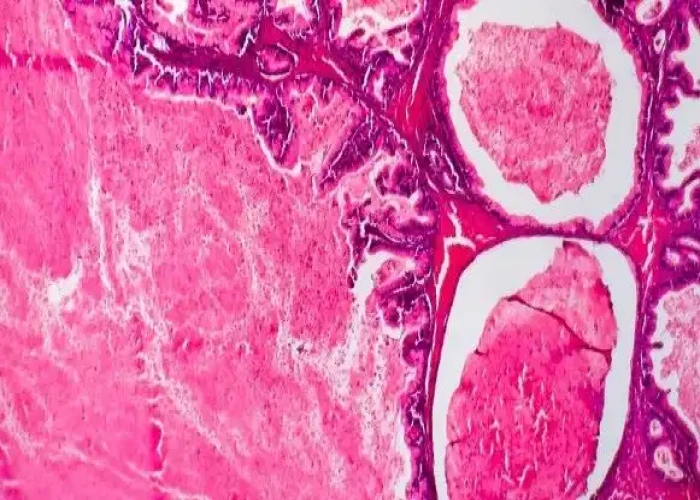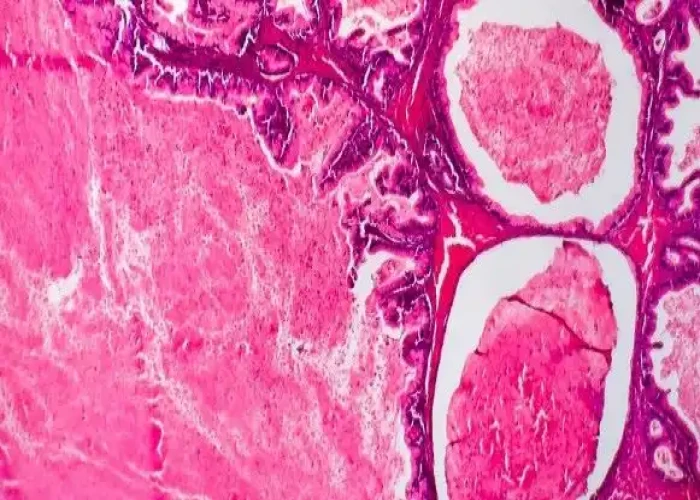 Welcome
Welcome
“May all be happy, may all be healed, may all be at peace and may no one ever suffer."
Undifferentiated pleomorphic sarcoma

Undifferentiated pleomorphic sarcoma (UPS), also known as malignant fibrous histiocytoma, is a type of cancer that can develop in various soft tissues of the body, including the limbs, trunk, and abdomen.
The exact cause of UPS is unknown, but certain factors, such as a history of radiation exposure or chronic inflammation, may increase the risk of developing this type of cancer. UPS can occur at any age, but it is most common in older adults.
Symptoms of UPS may include a painless lump or swelling in the affected area, pain, and reduced mobility. However, some people with UPS may not experience any symptoms.
Diagnosis of UPS typically involves a physical exam, imaging tests, and a biopsy of the affected tissue. Treatment options for UPS include surgery to remove the cancerous tissue, radiation therapy, and chemotherapy. The specific treatment plan depends on the location and size of the tumor, as well as the stage of cancer and the person's overall health.
The prognosis for UPS can vary depending on several factors, such as the stage of cancer and how well it responds to treatment. In general, early detection and treatment may improve the chances of a successful outcome.
It's important to consult a medical professional if you suspect that you may have UPS or any other medical condition, to discuss appropriate treatment options and prevent potential complications.
Research Papers
Disease Signs and Symptoms
- Abdomen lump
- Numbness
- Abdomen pain
- Fever
- Weight loss
- Growing lump or area of swelling
- If it grows very large, there may be a pain, tingling and numbness
Disease Causes
Undifferentiated pleomorphic sarcoma
It's not clear what causes undifferentiated pleomorphic sarcoma.
Doctors know this cancer begins when a cell develops changes in its DNA. A cell's DNA contains the instructions that tell a cell what to do. The changes tell the cell to multiply rapidly, creating a mass of abnormal cells (tumor). The cells can invade and destroy nearby healthy tissue. In time, the cancer cells can break away and spread (metastasize) to other parts of the body, such as the lungs and bones.
Disease Prevents
Disease Treatments
Treatment for undifferentiated pleomorphic sarcoma usually involves surgery to remove the cancer cells. Other options include radiation therapy and drug treatments (systemic therapies), such as chemotherapy, targeted therapy and immunotherapy. Which treatments are best for you will depend on the size and location of your cancer.
Surgery
When possible, doctors try to remove the sarcoma completely with surgery. The goal is to remove the cancer and a margin of healthy tissue around it with as minimal an impact as possible.
When the cancer affects the arms and legs, surgeons prefer to use limb-sparing operations. However, in some cases it may be necessary to amputate the affected arm or leg. Other treatments, such as radiation therapy and chemotherapy, might be recommended before surgery to shrink a cancer so that it's easier to remove without amputating the affected limb.
Radiation therapy
Radiation therapy uses high-powered beams of energy, such as X-rays or protons, to kill cancer cells. Radiation therapy can be given as:
- External beam radiation. This type of radiation comes from a machine that moves around you as you lie on a table. The machine directs the radiation to precise points on your body.
- Radiation may be used before surgery to shrink a sarcoma and make it easier to remove. It may also be used after surgery to kill any cancer cells that remain.
- Intraoperative radiation therapy (IORT). IORT is used during surgery just after the cancer is removed. The radiation is directed to the area around where the cancer used to be. IORT might be recommended if the cancer is located in an area that makes it difficult to remove the cancer completely during surgery.
Chemotherapy
Chemotherapy is a drug treatment that uses chemicals to kill cancer cells. It can be administered by pill or through a vein (intravenously), or both.
Chemotherapy is most often used to treat undifferentiated pleomorphic sarcoma that comes back after initial treatment or that spreads to other areas of the body.
Sometimes chemotherapy is used before surgery to shrink the cancer so that it's easier to remove during an operation.
Chemotherapy may also be combined with radiation.
Targeted drug therapy
Targeted drug treatments focus on specific abnormalities present within cancer cells. By blocking these abnormalities, targeted drug treatments can cause cancer cells to die.
For undifferentiated pleomorphic sarcoma, targeted therapy drugs may be combined with chemotherapy.
Some targeted therapies only work in people whose cancer cells have certain genetic mutations. Your cancer cells may be tested in a laboratory to see if these drugs might help you.
Immunotherapy
Immunotherapy uses your immune system to fight cancer. Your body's disease-fighting immune system may not attack your cancer because the cancer cells produce proteins that help them hide. Immunotherapy works by interfering with that process.
Immunotherapy treatments are generally reserved for people with advanced cancer.
Disease Diagnoses
Disease Allopathic Generics
Disease Ayurvedic Generics
Disease Homeopathic Generics
Disease yoga
Undifferentiated pleomorphic sarcoma and Learn More about Diseases

Schizoid personality disorder

Melanoma

Pericardial effusion

Dust mite allergy

Thumb arthritis

Central nervous system vascular malformations

Diarrhea

Small bowel prolapse (enterocele)
undifferentiated pleomorphic sarcoma, আনফ্রিফ্যান্টিয়েটেড প্লোমোর্ফিক সারকোমা
To be happy, beautiful, healthy, wealthy, hale and long-lived stay with DM3S.
